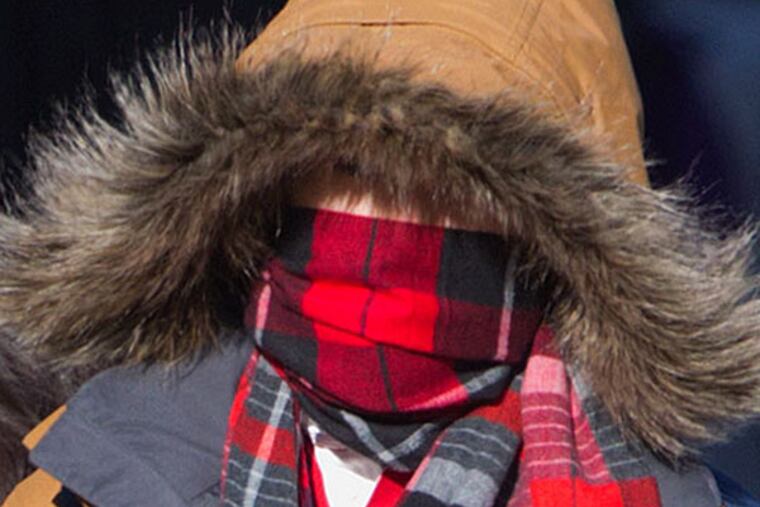The Pulse: The politicization of the weather
The time and temperature sign at 49th Street and the Avenue of the Americas in midtown Manhattan hit 57 degrees when I walked by Monday. By the overnight into Tuesday, New York City was reeling in 12-degree temperatures.

The time and temperature sign at 49th Street and the Avenue of the Americas in midtown Manhattan hit 57 degrees when I walked by Monday. By the overnight into Tuesday, New York City was reeling in 12-degree temperatures.
While cold weather engulfed the eastern United States, with the freeze line extending to Tampa, I was wondering how the frigid weather experienced by 180 million Americans could support the global-warming model for climate change. When I asked Jennifer Francis, a climate scientist at Rutgers University, to explain the connection, she offered a compelling view (which I will share in a moment), but our conversation left me wondering how her profession ever became subject to partisan divide.
I get that Republicans and Democrats disagree on such things as whether to extend emergency unemployment compensation or raise the minimum wage. On such issues, the parties are guided by a basic economic outlook. Republicans pride themselves on rewarding individual initiative and preserving the ability of small businesses to run themselves without government interference. The Democrats' aim is to preserve the safety net for the most needy and argue for an honest wage. But why does partisanship extend to other areas without regard for symmetry and logic?
Why, for example, is it likely that a person who opposes the extension of unemployment benefits and raising of the minimum wage probably champions Second Amendment rights and supports the death penalty? Similarly, I'll bet most of those who'd extend unemployment and boost the minimum wage are pro-choice and once opposed the surge in Iraq. My suspicion is that when it comes to confounding matters of public policy, some abstain by picking sides based on our comfort level with possible teammates, causing even matters such as climate change to be viewed as a political Rorschach test.
Last week, Rush Limbaugh made clear he isn't buying into the "polar vortex." Donald Trump went on Fox and referenced "this whole global-warming hoax," poking fun at the "global-warming scientists" and their frozen ship at the South Pole. He also managed to work in a dig at former Vice President Al Gore. ("He's the one who's the big proponent.")
From the left, Jon Stewart was quick to respond by lampooning a number of Fox personalities and their failure to distinguish between opinion and fact. Stephen Colbert did likewise. Even Al Roker got into the action. After hammering Limbaugh on Twitter, he went on the Today show to address the charge that the polar vortex was "some left-wing media conspiracy."
When I asked Francis how her area of expertise became such cannon fodder, she was quick to point out that not all Republicans are disbelieving of the perils posed by greenhouse-gas emissions. "I don't think it's a clean political slice down the line," she said.
"But that said, in certain parties there's more business interest related to fossil-fuel industries and, of course, if we decide we don't want to use fossil fuels anymore, then they stand to lose a lot of money, so there's a big financial stake there," Francis said. "I think there may also be some religious component to it, and some people believe that humans could never do something like this, and perhaps God would not allow us to do something like this, so there are different beliefs out there that come into play that are difficult to change people's minds when they're so ingrained."
I weighed her answer just as Pew Research released a survey that showed 60 percent of Americans believe in evolution, while a third do not. That latter number has remained constant in the last few years. What's changed is the gap between Republicans and Democrats. According to Pew, "just five years ago, 54 percent of Republicans and 64 percent of Democrats said humans have evolved over time, a difference of 10 percentage points. Today, 43 percent of Republicans and 67 percent of Democrats say humans have evolved, a 24-point gap."
No surprise, then, that there's strong suspicion about climate change when only 43 percent of the GOP believe in evolution. And if my theory about choosing sides based on teammates is correct, I'll bet the doubts began with Gore's championing of the issue.
As for why the extreme weather comports with her model of climate change, Francis reminded me that right now, Alaska is warmer than Atlanta, the former having had a very warm month of December. Meanwhile, California is experiencing one of its driest years ever. Across the pond, the United Kingdom is being pounded by storm after storm, while Scandinavia is having one of its warmest winters. Francis sees this as all related.
"So the connection to climate change, we think, is that what we're seeing is the jet stream taking these kind of very wild swings north and south more often now," Francis said. "And we believe that's related to the fact that the Arctic is warming so much faster than the rest of the country. . . . When we make this difference in temperature between the Arctic and areas farther south smaller, which is what is happening as the Arctic warms so fast, the jet stream responds to this by becoming more wavy, so we think this is at least one factor that's connected to the increasing frequency of these kinds of extreme weather events, all around the Northern Hemisphere."
The Pulse:
THE PULSE